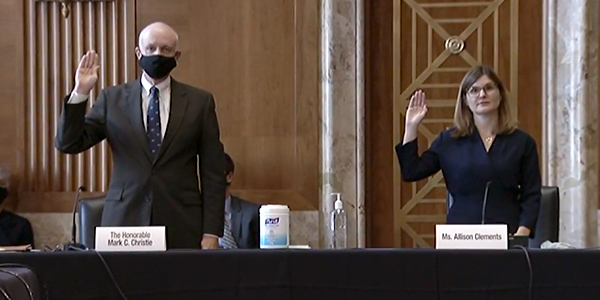President Trump’s nominees to FERC, Allison Clements and Mark Christie, said just enough to satisfy senators on both sides of the aisle during their confirmation hearing Wednesday.
Neither nominee gave away how they might decide on the commission’s thorniest issues, including carbon pricing, capacity markets and downstream greenhouse gas emissions from natural gas pipelines. Instead, they both said they did not want to “prejudge” any matters before they are sworn in and repeatedly committed to considering each matter that came before them on a case-by-case basis.
Both Republican and Democratic members of the Senate and Energy Natural Resources Committee were pressed for time because of votes on the Senate floor and did not press the nominees further for more clues. They gave no indication that they would oppose either nominee.
Clements, a Democrat and energy policy adviser for the Energy Foundation, and Christie, a Republican and chair of the Virginia State Corporation Commission, were nominated by Trump in late July. (See McNamee Leaves FERC.)
“Both nominees made multiple references to the need for objectivity, the importance of reliability and resiliency, and the central duty of the commission to ensure just and reasonable rates for consumers,” ClearView Energy Partners said. “We thought both nominees were circumspect in their responses … and steered clear of any remarks that might be construed as potentially prejudging an issue pending before the commission.”

President Trump’s nominees to FERC, Virginia SCC Chair Mark Christie and Energy Foundation consultant Allison Clements, are sworn in before their confirmation hearing Sept. 16. | Senate ENR Committee
Several Republicans, most notably Sen. Cory Gardner (Colo.), did focus on Clements and her previous work for the Natural Resources Defense Council’s Sustainable FERC Project. When Gardner asked her to “name an issue” on which she disagreed with her former colleagues, Clements without hesitation answered nuclear generation, which she said “plays an important role in providing carbon-free, reliable power to the system. That’s a place where many of my very well studied and smart colleagues might disagree with me.”
“Could you name another one, perhaps?” Gardner replied. He tried to get Clements to say whether she disagreed with the NRDC on its “fossil fuel agenda,” but she wouldn’t bite.
Democrats, meanwhile, tried to determine where Christie would side on the GHG dispute, which has caused tension at FERC. Democratic Commissioner Richard Glick has repeatedly dissented from the commission’s approvals of natural gas infrastructure, contending that they ignore a D.C. Circuit Court of Appeals ruling that said it must consider the effects of downstream GHG emissions in its environmental impact statements.

Senate ENR Chair Lisa Murkowski (R-Alaska) | Senate ENR Committee
Christie, however, demurred, telling Sen. Martin Heinrich (N.M.) that he did not “want to prejudge that issue because that is a legal question about what does the law require and what does the D.C. Circuit opinion require.” He often sounded like McNamee, a fellow Virginian, repeatedly stressing the importance of “the law and the facts,” a phrase that the former commissioner often used in his public appearances.
One of the few mentions of the RTOs came when Christie answered to a question about market manipulation from Sen. Maria Cantwell (D-Wash.). Christie acknowledged that Washington has been considering whether to allow its utilities to join an RTO with CAISO and advised that, having “lived in PJM world for the past 16 years, it is absolutely essential that you have an Independent Market Monitor in these RTO capacity markets. … We have an outstanding market monitor in PJM, Dr. [Joe] Bowring.”
Christie was president of the Organization of PJM States Inc. in 2007 when it pressed FERC to separate PJM’s Market Monitoring Unit into an IMM. In March 2008, FERC approved the current monitoring structure, with Bowring as head of his own independent firm.
Committee Chair Lisa Murkowski (R-Alaska) said she hopes to have both nominees confirmed before Congress adjourns at the end of the year. ClearView expects that to happen, albeit most likely after Election Day. “We did not observe any statements by either nominee that would appear to imperil their eventual confirmation,” ClearView said. “That said, we cannot foretell how a potentially contested presidential race could impact the day-to-day functioning of the U.S. Senate in a lame duck session.”
If confirmed, Clements’ term would end in June 2024 and Christie’s in June 2025.




